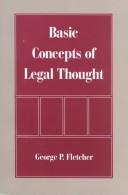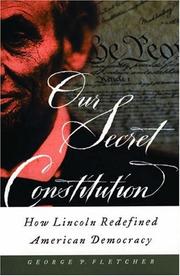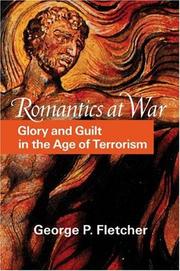| Listing 1 - 10 of 25 | << page >> |
Sort by
|

ISBN: 0195083369 9780195083361 0195083350 Year: 1996 Publisher: New York Oxford University Press
Abstract | Keywords | Export | Availability | Bookmark
 Loading...
Loading...Choose an application
- Reference Manager
- EndNote
- RefWorks (Direct export to RefWorks)
Legal theory and methods. Philosophy of law --- Jurisprudence --- Rule of law --- Supremacy of law --- Administrative law --- Constitutional law --- Law --- Philosophy --- -Philosophy --- Jurisprudence. --- Rule of law. --- Philosophy.
Book
ISBN: 280041135X 9782800411354 Year: 1996 Volume: [6] Publisher: Bruxelles,
Abstract | Keywords | Export | Availability | Bookmark
 Loading...
Loading...Choose an application
- Reference Manager
- EndNote
- RefWorks (Direct export to RefWorks)

ISBN: 0195141423 0195156285 Year: 2001 Publisher: Oxford Oxford University Press
Abstract | Keywords | Export | Availability | Bookmark
 Loading...
Loading...Choose an application
- Reference Manager
- EndNote
- RefWorks (Direct export to RefWorks)
Americans hate and distrust their government, but, at the same time, love and trust their government. These contradictory attitudes are resolved by Fletcher's novel interpretation of constitutional history. He says that the US has 2 constitutions - one catering to freedom and fear, the other to the need for security and social justice.
Constitutional amendments --- -Constitutional history --- -Constitutional history, Modern --- Constitutional law --- Constitutions --- History --- Amendments, Constitutional --- Constitutional entrenchment --- Lincoln, Abraham --- -Political and social views --- United States --- -Politics and government --- -Constitutional amendments -- United States. --- Constitutional history -- United States. --- Electronic books. -- local. --- Lincoln, Abraham, -- 1809-1865 -- Political and social views. --- United States -- Politics and government -- 1861-1865. --- United States. -- Constitution. -- 13th-15th Amendments. --- Constitutional history --- United States - General --- Regions & Countries - Americas --- History & Archaeology --- Lincoln, Abraham, --- Political and social views. --- United States. --- Politics and government --- -Lincoln, Abraham --- -Constitutional amendments --- Linkŭln, Abrakham, --- Linkolʹn, Avraam, --- Linkūln, Ibrāhīm, --- Linkan, ʼAbrehām, --- Lincoln, A. --- Lin-kʻen, --- Linken, --- Lin, Kʻen, --- Lingkʻŏn, --- Lincoln, Abe, --- Liṅkan, Ēbrāhaṃ, --- Liṅkan, Abrahāṃ, --- לינקאלין, --- לינקאלן, אייברעהעם, --- לינקולן, אברהם --- 林肯, --- Liṅkana, Ābrāhama,

ISBN: 0199872163 9786610655342 0195302656 1280655348 0198032439 1602566976 9780199872169 9780198032434 9780195302653 9780195156287 0195156285 9780195141429 0195141423 6610655340 9781280655340 9781602566972 0190286474 Year: 2001 Publisher: Oxford New York Oxford University Press
Abstract | Keywords | Export | Availability | Bookmark
 Loading...
Loading...Choose an application
- Reference Manager
- EndNote
- RefWorks (Direct export to RefWorks)
Americans hate and distrust their government, but, at the same time, love and trust their government. These contradictory attitudes are resolved by Fletcher's novel interpretation of constitutional history. He says that the US has 2 constitutions - one catering to freedom and fear, the other to the need for security and social justice.
Constitutional history --- Constitutional amendments --- Lincoln, Abraham, --- Political and social views. --- United States. --- United States --- Politics and government --- Linkŭln, Abrakham, --- Linkolʹn, Avraam, --- Linkūln, Ibrāhīm, --- Linkan, ʼAbrehām, --- Lincoln, A. --- Lin-kʻen, --- Linken, --- Lin, Kʻen, --- Lingkʻŏn, --- Lincoln, Abe, --- Liṅkan, Ēbrāhaṃ, --- Liṅkan, Abrahāṃ, --- לינקאלין, --- לינקאלן, אייברעהעם, --- לינקולן, אברהם --- 林肯, --- Liṅkana, Ābrāhama,
Book
ISBN: 0190903600 0190903589 0190903597 Year: 2020 Publisher: New York, New York : Oxford University Press,
Abstract | Keywords | Export | Availability | Bookmark
 Loading...
Loading...Choose an application
- Reference Manager
- EndNote
- RefWorks (Direct export to RefWorks)
International criminal law. --- Criminal law, International --- ICL (International criminal law) --- Criminal law --- International law --- Criminal jurisdiction --- International crimes

ISBN: 128083448X 0195350367 9780195350364 0195136950 9780195136951 0199881308 0197720420 9780199881307 9780197720424 Year: 2000 Publisher: Oxford New York Oxford University Press
Abstract | Keywords | Export | Availability | Bookmark
 Loading...
Loading...Choose an application
- Reference Manager
- EndNote
- RefWorks (Direct export to RefWorks)
This is a reprint of a book first published by Little, Brown in 1978. George Fletcher is working on a new edition which will be published by OUP in three volumes, the first of which is scheduled to appear in January 2001. Rethinking Criminal Law is still perhaps the most influential and often cited theoretical work on American criminal law. This reprint will keep this classic work available until the new edition can be published.
Criminal law. --- Criminal liability. --- Accountability, Criminal --- Criminal accountability --- Criminal liability --- Criminal responsibility --- Liability, Criminal --- Responsibility, Criminal --- Liability (Law) --- Crime --- Crimes and misdemeanors --- Criminals --- Law, Criminal --- Penal codes --- Penal law --- Pleas of the crown --- Public law --- Criminal justice, Administration of --- Criminal procedure --- Law and legislation --- Legal status, laws, etc.

ISBN: 1282087614 9786612087615 1400825172 9781400825172 9780691006512 0691006512 9781282087613 Year: 2002 Publisher: Princeton Princeton University Press
Abstract | Keywords | Export | Availability | Bookmark
 Loading...
Loading...Choose an application
- Reference Manager
- EndNote
- RefWorks (Direct export to RefWorks)
America is at war with terrorism. Terrorists must be brought to justice. We hear these phrases together so often that we rarely pause to reflect on the dramatic differences between the demands of war and the demands of justice, differences so deep that the pursuit of one often comes at the expense of the other. In this book, one of the country's most important legal thinkers brings much-needed clarity to the still unfolding debates about how to pursue war and justice in the age of terrorism. George Fletcher also draws on his rare ability to combine insights from history, philosophy, literature, and law to place these debates in a rich cultural context. He seeks to explain why Americans--for so many years cynical about war--have recently found war so appealing. He finds the answer in a revival of Romanticism, a growing desire in the post-Vietnam era to identify with grand causes and to put nations at the center of ideas about glory and guilt. Fletcher opens with unsettling questions about the nature of terrorism, war, and justice, showing how dangerously slippery the concepts can be. He argues that those sympathetic to war are heirs to the ideals of Byron, Fichte, and other Romantics in their belief that nations--not just individuals--must uphold honor and be held accountable for crimes. Fletcher writes that ideas about collective glory and guilt are far more plausible and widespread than liberal individualists typically recognize. But as he traces the implications of the Romantic mindset for debates about war crimes, treason, military tribunals, and genocide, he also shows that losing oneself in a grand cause can all too easily lead to moral catastrophe. A work of extraordinary intellectual power and relevance, the book will change how we think not only about world events, but about the conflicting individualist and collective impulses that tear at all of us.
Terrorism --- Guilt (Law) --- Romanticism --- War --- War (International law) --- Hostilities --- International law --- Neutrality --- Armed conflict (War) --- Conflict, Armed (War) --- Fighting --- Wars --- International relations --- Military art and science --- Peace --- Pseudo-romanticism --- Romanticism in literature --- Aesthetics --- Fiction --- Literary movements --- Criminal law --- Criminal liability --- Philosophy. --- Political aspects. --- Moral and ethical aspects --- War and society --- Romanticism. --- Just war doctrine. --- Justice. --- Terrorism. --- Guilt. --- Moral and ethical aspects. --- Guilt --- Emotions --- Ethics --- Conscience --- Shame --- Acts of terrorism --- Attacks, Terrorist --- Global terrorism --- International terrorism --- Political terrorism --- Terror attacks --- Terrorist acts --- Terrorist attacks --- World terrorism --- Direct action --- Insurgency --- Political crimes and offenses --- Subversive activities --- Political violence --- Terror --- Injustice --- Conduct of life --- Law --- Common good --- Fairness --- Jus ad bellum --- War (Philosophy) --- War and morals --- Psychological aspects --- Religious aspects
Book
ISBN: 9780190903572 Year: 2020 Publisher: Oxford Oxford University Press
Abstract | Keywords | Export | Availability | Bookmark
 Loading...
Loading...Choose an application
- Reference Manager
- EndNote
- RefWorks (Direct export to RefWorks)
Book
ISBN: 9781841137940 Year: 2008 Publisher: Oxford Hart
Abstract | Keywords | Export | Availability | Bookmark
 Loading...
Loading...Choose an application
- Reference Manager
- EndNote
- RefWorks (Direct export to RefWorks)
Book
Year: 1978 Publisher: Boston, Mass.
Abstract | Keywords | Export | Availability | Bookmark
 Loading...
Loading...Choose an application
- Reference Manager
- EndNote
- RefWorks (Direct export to RefWorks)
| Listing 1 - 10 of 25 | << page >> |
Sort by
|

 Search
Search Feedback
Feedback About UniCat
About UniCat  Help
Help News
News